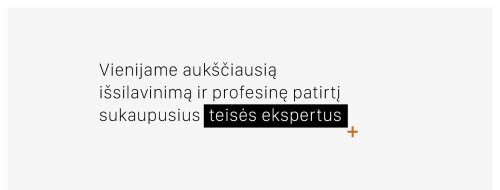Best Bail Bond Service Lawyers in Kaunas
Share your needs with us, get contacted by law firms.
Free. Takes 2 min.
List of the best lawyers in Kaunas, Republic of Lithuania
About Bail Bond Service Law in Kaunas, Republic of Lithuania
Bail bond service in Kaunas, Republic of Lithuania, functions within the country’s broader criminal justice framework. Unlike in some countries, Lithuania does not have private bail bond agencies. Instead, bail, referred to as “užstatas” in Lithuanian law, is a legal guarantee applied by the courts or pre-trial investigators to ensure a defendant appears in court or complies with imposed obligations while awaiting trial. Bail is governed by the Code of Criminal Procedure of Lithuania, which specifies how and when it can be used, who can apply for bail, and under what conditions it may be revoked or refunded. Typically, bail is paid directly to state authorities and there are strict legal criteria for its application and return.
Why You May Need a Lawyer
There are several reasons why individuals facing bail-related issues in Kaunas may need legal assistance. You might need a lawyer if you:
- Have been arrested and want to apply for bail
- Need to challenge an excessively high bail amount
- Do not understand the legal obligations attached to your release on bail
- Are seeking the return of your bail after the conclusion of proceedings
- Have had bail revoked or forfeited and wish to contest the decision
- Are a family member or acquaintance posting bail for someone else
- Face additional restrictions, like electronic monitoring, along with bail
Lawyers are familiar with local procedures and can advocate for your interests, prevent misunderstandings, and help avoid forfeiture of bail amounts.
Local Laws Overview
The main legal basis for bail in Lithuania is the Code of Criminal Procedure, especially Articles 119 and 120. Some key points relevant to Kaunas are:
- Bail can be imposed by a pre-trial judge or court to ensure compliance and appearance
- The amount is set considering the gravity of the offense, personal and financial status of the accused
- Bail is paid directly to the state budget, not to a private agency
- It is possible to use funds from relatives or other individuals with court approval
- Bail may be combined with other measures such as travel restrictions
- If the accused fails to comply, bail can be forfeited to the state
- Upon fulfilling all conditions and attending required procedures, bail is returned after the case concludes
Understanding these regulations is essential, as there are strict procedures and potential consequences for violations or misunderstandings.
Frequently Asked Questions
What is bail in Lithuania?
Bail is a legal security amount set by the court or an investigator to ensure an accused person will appear at future legal proceedings and follow all obligations during the pre-trial process.
How is the amount of bail determined?
The court considers the severity of the alleged crime, the accused’s personality, previous criminal record, and financial status when assessing bail amounts.
Can someone else pay bail on my behalf?
Yes, a relative, friend, or another person may pay bail for you, but the court must approve the source and method of payment.
What happens if bail is violated?
If the conditions of bail are breached, such as not appearing in court, the bail amount can be forfeited to the state and additional legal consequences may follow.
Is bail always available for every accused person?
No, bail may be denied in cases involving very serious offenses or if there is a risk the accused will flee, tamper with evidence, or influence witnesses.
How do I get my bail money back?
If all bail conditions are fulfilled, including legal appearances and obligations, bail is refunded after the case is resolved, either by the court or the prosecutor’s office.
Can bail conditions be changed?
Yes, a lawyer can help request changes to bail conditions, such as lowering the amount or changing restrictions, but court approval is required.
Are there private bail bond agencies in Lithuania?
No, Lithuania does not allow private bail bond agencies. All bail is managed by the justice system and paid directly to the state.
What legal conditions accompany release on bail?
The accused must comply with conditions set by the court, including reporting requirements, restrictions on leaving the country, and compliance with the law.
Do I need a lawyer to apply for bail?
While not strictly required, having a lawyer can greatly improve your chances of a fair bail decision and help navigate complex legal requirements.
Additional Resources
For individuals needing further information or assistance, the following resources and organizations can be helpful:
- Lithuanian Bar Association – for finding licensed defense attorneys
- Kaunas District Court – for information on bail procedures and payments
- Prosecutor General’s Office of Lithuania – for case inquiries and bail-related matters
- Legal aid centers – for those unable to afford private legal services
- Ministry of Justice of the Republic of Lithuania – general information on criminal procedure law
Next Steps
If you or a loved one is involved in a criminal case in Kaunas and is facing issues regarding bail, the following steps are recommended:
- Consult with a qualified criminal defense lawyer, especially one experienced with local courts in Kaunas
- Prepare all necessary documents regarding your financial status and personal background for your bail hearing
- Understand all rules and commitments attached to your bail to avoid forfeiture or added penalties
- If bail is refused or set at a high amount, ask your lawyer about options for appeal or modification
- Follow all legal advice and court requirements precisely until your case is resolved
Remember that legal procedures can be complex and deadlines are strict, so timely action and professional guidance are essential to protect your rights and finances.
Lawzana helps you find the best lawyers and law firms in Kaunas through a curated and pre-screened list of qualified legal professionals. Our platform offers rankings and detailed profiles of attorneys and law firms, allowing you to compare based on practice areas, including Bail Bond Service, experience, and client feedback.
Each profile includes a description of the firm's areas of practice, client reviews, team members and partners, year of establishment, spoken languages, office locations, contact information, social media presence, and any published articles or resources. Most firms on our platform speak English and are experienced in both local and international legal matters.
Get a quote from top-rated law firms in Kaunas, Republic of Lithuania — quickly, securely, and without unnecessary hassle.
Disclaimer:
The information provided on this page is for general informational purposes only and does not constitute legal advice. While we strive to ensure the accuracy and relevance of the content, legal information may change over time, and interpretations of the law can vary. You should always consult with a qualified legal professional for advice specific to your situation.
We disclaim all liability for actions taken or not taken based on the content of this page. If you believe any information is incorrect or outdated, please contact us, and we will review and update it where appropriate.















